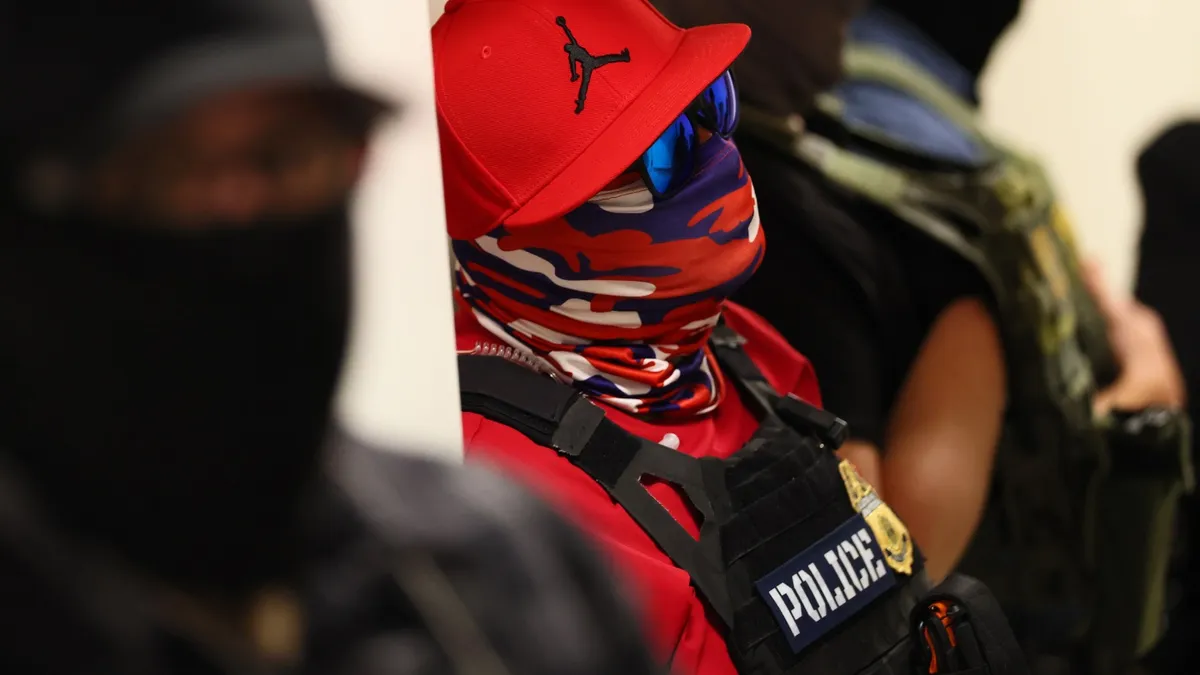
In recent months, a series of disturbing videos have surfaced online, showing violent arrests conducted by federal agents as part of the Trump administration's aggressive crackdown on illegal immigration. These videos, captured by eyewitnesses, depict tense encounters where individuals are confronted by officers clad in tactical gear, including those from Immigration and Customs Enforcement (ICE). The scenes often show masked agents using forceful tactics, raising serious questions about the legality and morality of their actions.
One noteworthy incident took place outside a courthouse in San Antonio, where a woman and her young son were taken away by men in plainclothes. The husband, visibly distressed, called out for his family in Spanish, highlighting the emotional toll these operations have on communities. According to Department of Homeland Security (DHS) Assistant Secretary for Public Affairs Tricia McLaughlin, the agents wear masks to protect themselves from doxing and increased threats. However, civil rights advocates argue that this practice instills fear in the community and undermines public trust in law enforcement.
Stephen Kass, a member of the New York City Bar Association, voiced concerns regarding the appropriateness of masking in these operations. He noted that while masks may be justified in certain situations, such as undercover operations against organized crime, the same rationale does not apply to the arrests of everyday individuals. This sentiment was echoed by Job Garcia, a witness to one such arrest at a Home Depot in Hollywood, California. Garcia recorded the incident, which involved agents surrounding a box truck and forcefully breaking the window. His video captures the chaos and tension of the moment, as he urged the driver not to comply with the agents' demands.
Garcia was detained for over 24 hours without a clear explanation, a situation he found deeply troubling. He claims that he was targeted for speaking out against the agents' actions, stating, "What they're doing is actual terror, and the pain they're inflicting on the community is huge." In response to his treatment, Garcia is suing the DHS for $1 million, alleging that he was unjustly profiled due to his Latino heritage. The Mexican American Legal Defense and Educational Fund (MALDEF) is representing him, emphasizing that no warrants were presented during the arrests at the location where predominantly Latino workers were seeking employment.
McLaughlin has refuted claims of profiling, arguing that Garcia was arrested for allegedly assaulting a Border Patrol officer. She maintained that the agents clearly identify themselves during operations and that masking is a necessary safety measure given the threats against law enforcement. Furthermore, she pointed to the existence of regulations that require officers to announce their identity during arrests, despite criticisms that the practice is not consistently followed.
In response to the growing concerns, Democratic Senators Alex Padilla of California and Cory Booker of New Jersey have introduced legislation aimed at banning federal immigration agents from wearing masks during arrests. This legislative move follows incidents where masked agents have been accused of using excessive force, raising alarms about public safety and accountability.
Garcia's experience reflects a broader atmosphere of fear within immigrant communities, particularly among those who may not speak English fluently. He expressed concern for his mother, a U.S. citizen who has lived in the country for decades, noting that they no longer allow her to go out alone. The pervasive fear has led many community members to stay indoors, altering their daily lives and interactions.
As Garcia continues to advocate for accountability, he views his legal action as a means of reclaiming power and raising awareness about the implications of these aggressive immigration enforcement tactics. The ongoing debate over the legality and ethics of these actions remains a critical issue as communities grapple with the reality of federal immigration policies.